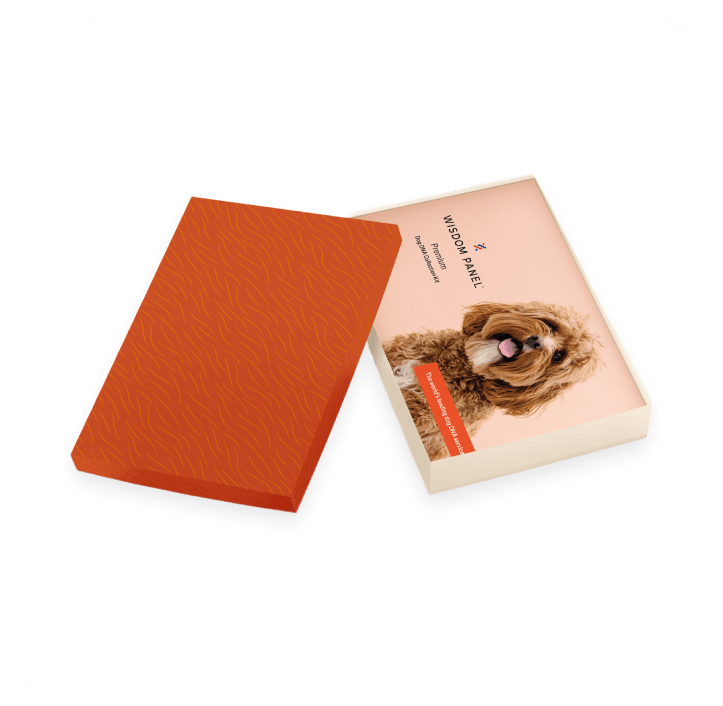



Know the most about your pup with Wisdom Panel Premium for just $NaN more.

Present at birth
For autosomal recessive disorders, dogs with two copies of the variant are at risk of developing the condition. Dogs with one copy of the variant are considered carriers and are usually not at risk of developing the disorder. However, carriers of some complex variants grouped in this category may be associated with a low risk of developing the disorder. Individuals with one or two copies may pass the disorder-associated variant to their puppies if bred.
At risk dogs have a small chance of showing signs of this disease in their lifetime, but many will never develop the condition due to absence of additional risk factors.
Partner with your veterinarian to make a plan regarding your dog’s well-being, including any insights provided through genetic testing. If your pet is at risk or is showing signs of this disorder, then the first step is to speak with your veterinarian.
Thrombopathia is caused by a defect in platelet adhesion which leads to the inability for normal clotting function to occur. As the defect is in the ability for platelets to transmit internal signals properly, bleeding time tests will be prolonged while clinical tests (like platelet number, von Willebrand factor, clot retraction and coagulation screens) will tend to be normal. Affected dogs will have an increased risk for excessive bleeding in cases of trauma or surgery, and the risk for spontaneous bleeding can range from mild to severe. Additional clinical signs include nosebleeds, bleeding of the gums, bruises, hematomas and internal bleeding. Urinary tract or gastrointestinal bleeding may also occur. In cases with slow, insidious bleeding, iron deficiency anemia may be observed. Alternatively, if gastrointestinal bleeding is significant then black, tarry stools may be seen. Affected dogs may show signs of lameness or stiffness if bleeding in the joints is present. It is not uncommon for mild symptoms to go unidentified until surgery or trauma occurs.
There is no treatment available for Thrombopathia. Although affected dogs are susceptible to excessive bleeding, they usually have normal lifespans. Affected dogs should have blood samples taken from minor vessels and pressure applied to the sampling site afterwards. Bleeding of the gums may be prevented by offering soft food and avoiding chewing hard toys or objects. Affected dogs should be monitored closely for excessive and prolonged bleeding during and after any required surgical procedures or following any trauma. Blood or platelet transfusions should be provided as necessary to ensure proper clotting if other means are unsuccessful. In cases of less severe bleeding, keeping the dog calm while applying pressure to the wound may be sufficient.
There are many responsibilities to consider when breeding dogs. Regardless of test results it is important that your dog is in good general health and that you are in a position to care for the puppies if new responsible owners are not found. For first time or novice breeders, advice can be found at most kennel club websites.
This disorder is autosomal recessive meaning that two copies of the variant are needed for a dog to be at an elevated risk for being diagnosed with the condition. A carrier dog with one copy of the Thrombopathia (Discovered in the Basset Hound) variant can be safely bred with a clear dog with no copies of the Thrombopathia (Discovered in the Basset Hound) variant. About half of the puppies will have one copy (carriers) and half will have no copies of the variant. Puppies in a litter which is expected to contain carriers should be tested prior to breeding. Carrier to carrier matings are not advised as the resulting litter may contain affected puppies. Please note: It is possible that disorder signs similar to the ones associated with this Thrombopathia variant could develop due to a different genetic or clinical cause.
| Gene | RASGRP1 |
|---|---|
| Variant | Deletion |
| Chromosome | 18 |
| Coordinate Start | 52,417,313 |
| Coordinate End | 52,417,315 |
All coordinates reference CanFam3.1
Boudreaux M.K., Catalfamo J.L., Klok M. (2007). Calcium-diacylglycerol guanine nucleotide exchange factor I gene mutations associated with loss of function in canine platelets. Transl Res, 150(2), 81-92. View the article